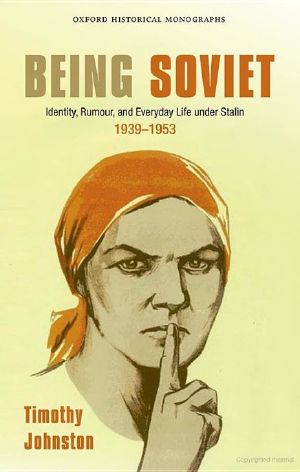Being Soviet · Identity, Rumour, and Everyday Life Under Stalin 1939-1953

- Authors
- Johnston, Timothy
- Publisher
- Oxford University Press, USA
- Tags
- russia & the former soviet union , social history , communism; post-communism & socialism , 20th century , europe , history , political ideologies , general , modern , political science
- ISBN
- 9780199604036
- Date
- 2011-09-07T00:00:00+00:00
- Size
- 0.37 MB
- Lang
- en
*Being Soviet* adopts a refreshing and innovative approach to the crucial years between 1939 and 1953 in the USSR. It addresses two of the key recent debates concerning Stalinism: 'what was the logic and language of Soviet power?' and 'how did ordinary citizens relate to Soviet power?' In relation to the first debate, Timothy Johnston shifts the focus away from Russian nationalism onto Soviet identity which, in relation to the outside world, provided a powerful frame of reference in the late-Stalin years. 'Sovietness' is explored via the newspapers, films, plays, and popular music of the era.
Johnston's most significant contribution lies in his novel answer to the question 'How did ordinary citizens relate to Soviet power?' He avoids the current Foucault-inspired emphasis on 'supporters' and 'resistors' of the regime. Instead, he argues that most Soviet citizens did not fit easily into either category. Their relationship with Soviet power was defined by a series of subtle 'tactics of the habitat' (Kotkin) that enabled them to stay fed, informed, and entertained in these difficult times. *Being Soviet* offers a rich and textured discussion of those everyday survival strategies via the rumours, jokes, hairstyles, music tastes, sexual relationships, and political campaigns of the era. Each chapter finishes by exploring what this everyday behaviour tells us about the collective mentalite of Stalin-era society.
*Being Soviet* focuses on the place of Britain and America within Soviet identity; their evolution from wartime allies to Cold War enemies played a vital role in redefining what it meant to be Soviet in Stalin's last years.